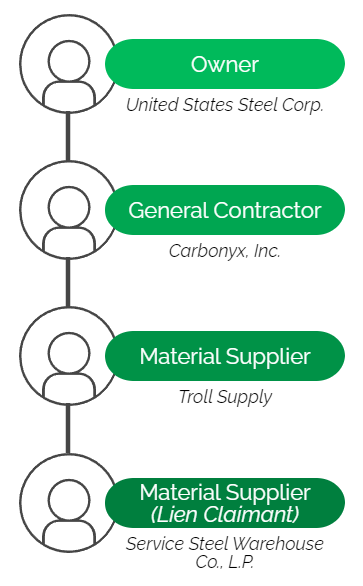Material Suppliers’ Mechanic’s Lien Rights for Projects in Indiana
In a significant legal reversal, a material supplier selling to a material supplier now has mechanic’s lien rights in Indiana. For over 100 years Indiana statute has dictated mechanic’s lien rights aren’t available to material suppliers if they are selling to another material supplier. But now… NOW… material suppliers rejoice! Let’s review the case that got us here and look at the steps to secure mechanic’s lien rights in Indiana.
The Case That Made the Difference for Indiana Material Suppliers
On March 10, 2022, the Indiana Supreme Court issued a ruling in the case of Service Steel Warehouse Co., L.P. v. United States Steel Corp. A ruling that reverses a 125-year-old precedent. Material suppliers selling to material suppliers now have mechanic’s lien rights.
United States Steel Corp. (the project owner) hired Carbonyx, Inc. (the GC). The GC contracted with Troll Supply, who was hired to fabricate steel for the project. Service Steel Warehouse Co., LP (Service Steel) sold steel to Troll Supply for fabrication.

Troll Supply failed to pay Service Steel $452,825.03 for the steel. Service Steel filed a mechanic’s lien and later sued to enforce its mechanic’s lien. The owner argued Service Steel wasn’t entitled to mechanic’s lien rights because Troll Supply did not perform any labor on the jobsite, and under Indiana statute, there are no lien rights for a material supplier to a material supplier. At the time, the trial court agreed and issued a decision in favor of the owner. Service Steel appealed.
The trial court’s decision was reversed when the case went before the Court of Appeals. The Court of Appeals determined the mechanic’s lien statute doesn’t require that Troll Supply provide on-site work, because the significant fabrication work Troll Supply completed off site counted as “substantial portion of the prime contract,” which makes Troll Supply a subcontractor, not a material supplier. If Troll Supply is a subcontractor, then Service Steel’s mechanic’s lien is valid, because supplier-to-supplier is no longer the issue. (I actually wrote about this appeal, you can check it out here.) Then, the project owner appealed the Court of Appeals decision and here we are.
In its decision, the Supreme Court said (and this might be my favorite line from the court opinions I have read) “A mechanic’s lien is a statutory tool to help collect payment for labor and materials that improve real property… It prevents landowners from enjoying their improved property while those who provided the labor and materials get the shaft.”
The Indiana Supreme Court acknowledged Indiana mechanic’s lien law had “long been interpreted to only confer lien rights on suppliers who furnished materials to a recipient who performed on-site work, which meant a contractor or subcontractor.” But the long-standing interpretation is wrong because it “conflicts with the statute’s plain language, which unambiguously allows any person who furnishes materials for the erection of a building to have a lien.”
The decision dives deeper into review of some previous case decisions. The court said there may be times when material supplier to material supplier’s lien could be invalid, but those decisions “rest with the legislature, not the court.” Ultimately, if a material supplier furnishes materials to a project, it is entitled to lien the project for which it supplied materials.
“Under Indiana’s mechanic’s lien statute, a supplier that furnished materials for the erection of a building, regardless of the recipient, can have a lien on that building and the accompanying land. Of course, the supplier must have furnished the materials ‘for the particular building upon which’ it bases its lien.”
Mechanic’s Lien Rights for Private Commercial Projects in Indiana
You aren’t required to serve a preliminary notice; we recommend you serve a non-statutory notice to let everyone on the project know you are furnishing materials and/or services. In the event you are unpaid, you should file your sworn statement and notice of intention to lien with 90 days from your last furnishing. Then, if needed, you should file to suit to enforce the lien within 1 year from filing the lien.
A Win!
Congratulations to Service Steel and its attorney, Joshua Casselman of Rubin & Levin, P.C., for fighting the good fight. Mechanic’s liens are a tremendous tool in construction credit; it’s wonderful to see the good guys win and pave the way for future material suppliers.


